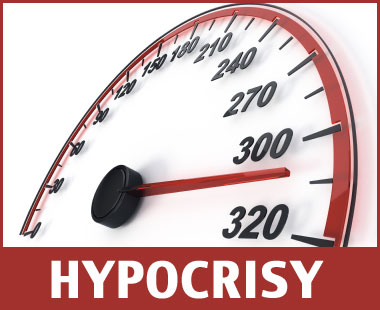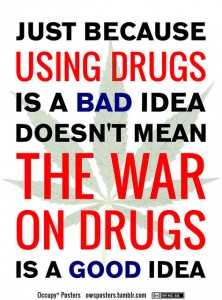To advocate for sensible drug laws is not to advocate for drug use. But we have to recognise how prevalent drug use is, in our society. Lots of people like to get a hit from drugs. Some of it’s normalised and socially sanctioned no matter what the costs – like alcohol; some if it’s increasingly stigmatised, like tobacco. But the debate over legal synthetic highs shows how hypocritical and unhelpful our current law is when it comes to cannabis.
Our national drug and alcohol policy is problematic – it fails to address either the causes of drug use, addiction and harm (social dislocation, human nature, boredom?), or the consequences (illness, domestic violence, imprisonment, death and other personal and societal costs). Our drug policy is inconsistent – we celebrate alcohol, saturate every social event with it, exalt its barons; and alcohol, among other highs will continue to be legal while others less harmful are banned. Current drug legislation alienates illicit drug users from society and the law, criminalises a prevalent past-time without either stopping its use or treating its health effects, costs the state huge amounts of money, and creates a public contradiction that’s hard to justify.
Health professionals and users both agree that synthetic highs are worse than cannabis in their effects – the hit is stronger and lasts longer, and has a nastier edge. Dependence and withdrawals are adverse effects. But they’ve been legal, so there hasn’t been the risk of criminal and social stigma, nor risk of gang association that comes with access to illegal pot. There’s no workplace testing for synthetic highs, so that has provided an added incentive for recreational drug users to buy a worse product than they otherwise might. As a result, legal high retailers do a roaring trade, and harm from use and withdrawals is being seen in family violence, anxiety, hospitalisation and dependency, even though many of those buying the hitherto legal highs, would prefer to smoke more natural, less harmful dope.
Now that synthetic highs are to be banned, users will revert to procuring either stockpiled or imported black market synthetic highs, or cannabis, thereby shifting drug problems underground. Drug use seems to be part of the human condition, so we should treat problem drug use and addiction, with appropriate sensible judicial and medical treatment.
Unlike synthetic highs you don’t need to test marijuana on animals to prove anything about its safety or otherwise. Cannabis has had thousands of years of testing on willing subjects, and has directly killed none. But that’s not to encourage its use, especially at work, while driving, for young people, around children, in public or for those with mental illness or a fragile psyche. That applies to all other drug based stimulants as well. There should be a common standard of impairment and subsequent regulation of all drugs and alcohol based on effects, not arbitrarily, or based on bias towards certain products.







Most people aren’t aware that around half of all prescription medicine passes through people’s systems and out into the water ways, producing high levels of toxic pollutants
Well said.
My question to the politicians, which is regularly avoided, is that there is only evidence of disastrous failure when it come to the results of the war on drugs – unless of course it’s your police or corrections budget ballooning every year…
well said
It would be really nice to see some inclusive language used when discussing drug use. With the exception of a handful of teetotalers, straight-edgers, and hare krishnas, everyone in this country uses drugs (alcohol is a drug). Yet always we see these handwringing columns which talk of drug users as some recently-discovered minority, and pathologize all drug use. Most people I know use drugs regularly, and although I have seen many people “overdo it” or become dependent, the drug most commonly associated with that behaviour is alcohol. Criminalizing (some) drug use and refusing to allow a legally regulated market to operate mainly has the effect of criminalizing working class people who don’t have the connections, social status, or fancy lawyers to get them off drug charges.
As I’ve said before, there are two separate issues here, which require separate legislative responses. The first issue is the personal choice to use; to drink, to smoke, to snort, even to inject. Like those jumping out of planes with a parachute on, we do these things for enjoyment, and the risk of injury or death is one we accept. The government should do nothing to regulate these choices, but refuse to let us blame the drugs we chose to take for the consequences of our actions, and hold us accountable for any harm we may do to others regardless. All legal penalties for possession and production for personal use, and non-commercial sharing (or “social dealing” as the Law Commission calls it) should be struck from the books.
The second issue is the commercial sale of drugs. Like driving a car, this has the potential to cause harm or even death if done irresponsibly (R18 etc). Like driving a car, a license should be required, and dealing without a license, like driving without a license, should be punished appropriately. As with driver licensing, central government should standardize the tests. As with legal prostitution, local government should have some say over where and how dealing businesses operate.
Dear author: Do NOT refer to cannabis as “dope” as in “more natural, less harmful dope.” Do you not have any idea how bad that sounds?
Your arguments are logical, but I think we forget that ANY drug can be dangerous if sufficiently concentrated and/or wrongly used. Caffeine, tannin, aspirin, etc (the list goes on) are all useful drugs but even they can be dangerous or be used to make dangerous products. On the other hand some “dangerous” drugs have some good uses, eg. opium, cannabis and morphine have powerful and useful pain killing qualities. Societal acceptance is at the heart of the problem. History and tradition governs that we think of some drugs as safe and others dangerous. Ironically one of the most dangerous drugs is legal and widely available in most countries other than Muslim countries, alcohol. By your logic alcohol should be banned. They tried this in America last century and it was unenforceable.
Comments are closed.